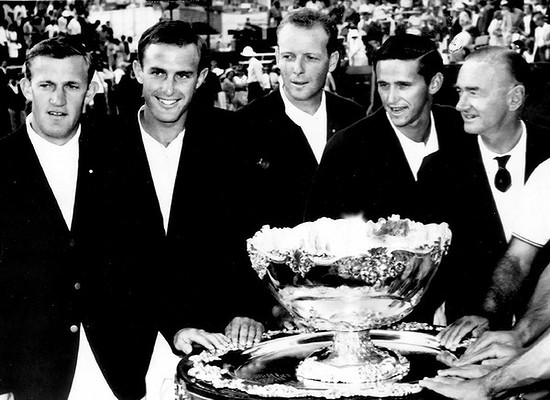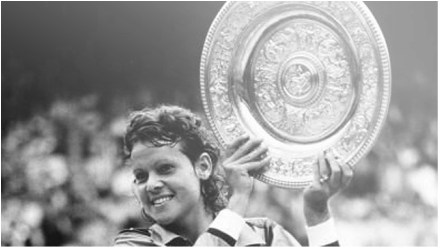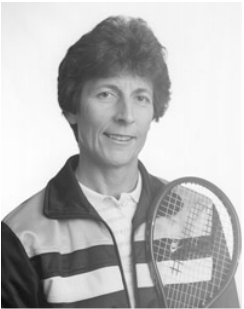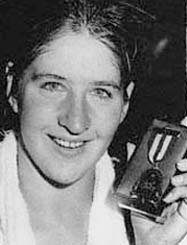Sporting Achievements and Sports People
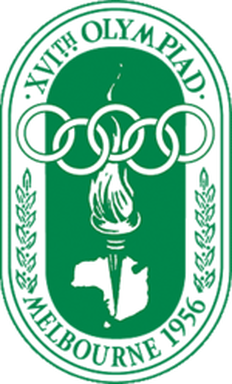
1956 Brisbane Summer Olympics Logo
Melbourne Olympics
The major sporting event that occurred during the 1950s to the end of the 1970s was the 1956 Summer Olympics, which was held in Melbourne. The 1956 Summer Olympics were the first to be held in the
Southern Hemisphere and the first to leave Europe and North America.
The Premier of Victoria refused to allocate money for the Olympic Village, caused by a financial strain.
Because of lack of funds available for the 1956 Olympics, the IOC President Avery Bundage suggested that Rome,
which was the host for the 1960 Olympic games could be the replacement site as
they were so far ahead of Melbourne with Preparations of the Olympics.
The games unfolded smoothly, and were widely known as the ‘Friendly Games’. Betty Cuthbert, an 18-year-old from Sydney,
won the 100- and 200-metre dashes and ran a great final leg in the 4 x 100-metre relay to overcome Great Britain's lead
and claim her third gold medal. The veteran Shirley Strickland repeated in the 80-metre hurdles and also ran on the relay team, running her career total to seven, three gold’s, a silver, and three bronze medals.
The Australian Swimming Team were the ones who really shone amongst the rest.
They won all the freestyle races in both men’s and women’s, coming out in the end with a total of eight gold medals,
four silver and 2 bronze. Dawn Fraser won gold medals in the 100-metre freestyle and as the leadoff swimmer on the
4 x 100-metre relay team.
The Davis Cup
Even though the Davis Cup has been around since the beginning of the 1900s, Australia has been unconditionally
involved in this annual Tennis Tournament. Australia along with the USA was the only teams
to win from 1937 to 1973. Australia won the Davis Cup title 16 times in between
the years 1939 and 1973.
Significant Women in Sporting
Between 1950 and 1970 was the biggest growth for women’s sports, which were; tennis, golf and squash.
These sports were seen as most “lady–like”. This period of time seen sports champions like
squash player Heather McKay (Blundell) and tennis players Margaret Court (Smith)
and Evonne Cawley (Goolagong).
The major sporting event that occurred during the 1950s to the end of the 1970s was the 1956 Summer Olympics, which was held in Melbourne. The 1956 Summer Olympics were the first to be held in the
Southern Hemisphere and the first to leave Europe and North America.
The Premier of Victoria refused to allocate money for the Olympic Village, caused by a financial strain.
Because of lack of funds available for the 1956 Olympics, the IOC President Avery Bundage suggested that Rome,
which was the host for the 1960 Olympic games could be the replacement site as
they were so far ahead of Melbourne with Preparations of the Olympics.
The games unfolded smoothly, and were widely known as the ‘Friendly Games’. Betty Cuthbert, an 18-year-old from Sydney,
won the 100- and 200-metre dashes and ran a great final leg in the 4 x 100-metre relay to overcome Great Britain's lead
and claim her third gold medal. The veteran Shirley Strickland repeated in the 80-metre hurdles and also ran on the relay team, running her career total to seven, three gold’s, a silver, and three bronze medals.
The Australian Swimming Team were the ones who really shone amongst the rest.
They won all the freestyle races in both men’s and women’s, coming out in the end with a total of eight gold medals,
four silver and 2 bronze. Dawn Fraser won gold medals in the 100-metre freestyle and as the leadoff swimmer on the
4 x 100-metre relay team.
The Davis Cup
Even though the Davis Cup has been around since the beginning of the 1900s, Australia has been unconditionally
involved in this annual Tennis Tournament. Australia along with the USA was the only teams
to win from 1937 to 1973. Australia won the Davis Cup title 16 times in between
the years 1939 and 1973.
Significant Women in Sporting
Between 1950 and 1970 was the biggest growth for women’s sports, which were; tennis, golf and squash.
These sports were seen as most “lady–like”. This period of time seen sports champions like
squash player Heather McKay (Blundell) and tennis players Margaret Court (Smith)
and Evonne Cawley (Goolagong).
Evonne Goolagong CawleyEvonne Goolagong was named Australian Number One Female Tennis Player after she won Seven Grand Slam singles titles, and reaching a goal of eighteen Grand Slam singles finals in her career. Goolagong played in seventeen Grand Slam singles Finals during the 1970s. This was a period record for any tennis player, man or
women. With reaching the final of almost every Grand Slam she entered between 1873 and 1978, Evonne Goolagong was definitely worth of being ranked Number One in the world for two weeks in 1976. Goolagong was the Mixed Doubles Champion in France in 1972. Evonne Goolagong Cawley was the Doubles Champion in Wimbledon in 1974. In 1978, Goolagong joined with Peggy Michel to win the Ladies’ Doubles Title. Goolagong made seven consecutive finals at the Australian Open, winning four titles in a row, both records for this time. |
Heather McKayHeather McKay is seen as the greatest female player in history of the game and is possibly the greatest-ever sportswoman.
McKay dominates the women’s squash game in the 1960s and 1970s, winning 16 consecutive British Open Titles between 1962 and 1977. In 1979, she won the inaugural women’s World Open Title. She remained undefeated during that period. In 1976 Heather McKay won the Women’s World Squash Championship which was held in Brisbane. This was an unofficial world championship. Heather McKay also participated in Field Hockey, which she proved to be very good at. McKay was a part of the Australian Women’s Hockey Team in 1967 and 1971. |
Dawn FraserDawn Fraser is one of only three Swimmers to win the same Olympic event three times in a row, which hers was the 100m Freestyle.
Fraser won eight Olympic medals in her career, including eight gold medals and six commonwealth gold medals and she also held 39 records. From the 1 December 1956 to January 8 1972, Dawn Fraser held the 100 meters Freestyle Record. Fraser marched in the 1964 Summer Olympics in Tokyo Opening Ceremony, enraging the Swimming Team Sponsors and the Australian Swimming Union, and wearing an older swimming costume when competing because it was more comfortable than the new swimming costume supplied by the sponsors. Dawn Fraser was accused of stealing of stealing an Olympic Flag from the Flag Pole outside of Emperor Hirohito’s Place. Fraser was arrested but realised later on without charges against her. The Australian Swimming Union Suspended Dawn Fraser for 10 years after she was given the Flag as a souvenir. Fraser was named Australian of the year in 1964, and made a Member of the Order of the British Empire in 1967. |
